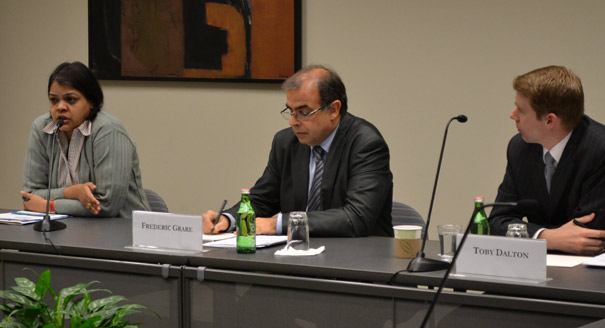{
"authors": [
"Toby Dalton",
"Frederic Grare",
"Monika Chansoria"
],
"type": "event",
"centerAffiliationAll": "dc",
"centers": [
"Carnegie Endowment for International Peace",
"Carnegie China"
],
"collections": [],
"englishNewsletterAll": "",
"nonEnglishNewsletterAll": "",
"primaryCenter": "Carnegie Endowment for International Peace",
"programAffiliation": "SAP",
"programs": [
"South Asia"
],
"projects": [],
"regions": [
"South Asia",
"India",
"East Asia",
"China"
],
"topics": [
"Security",
"Arms Control"
]
}
India-China Relations: The Need for Confidence Building Measures
Tue, October 9th, 2012
Washington, D.C.
IMGXYZ3971IMGZYXThis year marks the fiftieth anniversary of the Sino-Indian border war, yet the present regional and bilateral conditions are still far from congenial. India and China display a peculiar case of “constrained cooperation,” with economically convergent interests tending to artificially overshadow prevailing strategic differences. China acknowledges that it shares an interest in a peaceful and stable South Asia. Nevertheless, strengthened Indo-U.S. ties are widely perceived in Beijing as an attempt by Washington to enlist India as a counterweight to China.
To reduce the potential friction, there is a need for new confidence-building measures (CBMs) between India and China. Monika Chansoria of Sandia National Laboratories and Toby Dalton of the Carnegie Endowment discussed this idea, and Carnegie’s Frederic Grare moderated.
Disputes and Divergences
- Territorial Claims: Chansoria explained that border and territorial disputes remain one of the biggest sticking points in Sino-Indian relations. Despite years of high-level special representative talks, India’s border with China remains largely undefined. China also claims sovereignty over the northeastern Indian state of Arunachal Pradesh, and tensions have flared in recent years over Beijing’s refusal to grant Chinese visas to residents of the disputed state, on the grounds that Arunachal Pradesh’s residents are, in their eyes, already Chinese citizens.
- The Sino-Pakistani Relationship: Chansoria characterized China’s security relationship with Pakistan as enduring and strengthening, a dynamic that she said gives pause to many in New Delhi. The increased presence of Chinese military engineers in the border flashpoint of Pakistani-controlled Kashmir has Indian defense experts especially concerned, she explained.
- The Tibetan Diaspora: Over 100,000 Tibetan exiles currently live in India, but Beijing and New Delhi have done little to formalize their status. Chansoria expressed concern that this issue could become more pressing in the coming years, especially if the youngest generation of Tibetans proves more assertive in its dispute with China.
The Potential of Confidence-Building Measures
- A Good First Step? CBMs on certain mutually important issues may sow the seeds for broader Sino-Indian cooperation, Chansoria said, though Dalton questioned whether the disputes between the two powers are too significant for such an approach.
- A Shared Enemy: Both China and India have confronted and fallen victim to terrorist violence, and Chansoria said there is common ground for CBMs to combat this threat. Beijing and New Delhi have already taken steps to collaborate on counterterrorism, coordinating joint military exercises and setting up a high-level policy dialogue.
- Nuclear Perspectives: In Chansoria’s view, Chinese and Indian philosophies on nuclear weapons have much in common—both favor disarmament and No First Use policies—which creates room for agreements on how best to develop a stable nuclear balance in the region. She suggested a wide range of nuclear CBMs, from joint advocacy of global disarmament to the separation of land-based nuclear warheads from their delivery systems. Dalton, however, argued that there are limits to any nuclear agreement between India and China, pointing out significant differences in how the two sides perceive each other’s arsenals and policies.
- Economic Ties: Dalton argued that India and China’s increased economic interdependence could undermine, not support, confidence-building in the region. He highlighted how, in the past, China has used its economic leverage to force policy changes.
Carnegie does not take institutional positions on public policy issues; the views represented herein are those of the author(s) and do not necessarily reflect the views of Carnegie, its staff, or its trustees.
Event Speakers
Toby Dalton is a senior fellow and co-director of the Nuclear Policy Program at the Carnegie Endowment. An expert on nonproliferation and nuclear energy, his work addresses regional security challenges and the evolution of the global nuclear order.
Frédéric Grare was a nonresident senior fellow at the Carnegie Endowment for International Peace, where his research focuses on Indo-Pacific dynamics, the search for a security architecture, and South Asia Security issues.
Monika Chansoria

